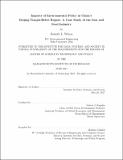Impacts of environmental policy in China's Beijing-Tianjin-Hebei region : a case study of the iron and steel industry
Author(s)
Wilson, Danielle L. S.M. Massachusetts Institute of Technology
DownloadFull printable version (2.180Mb)
Alternative title
Case study of the iron and steel industry
Other Contributors
Technology and Policy Program.
Advisor
Valerie J. Karplus.
Terms of use
Metadata
Show full item recordAbstract
This thesis focuses on the drivers of regional development and environmental control decisions in the iron and steel industry in the Beijing-Tianjin-Hebei region of China. The analysis presented includes (1) a county-level econometric analysis of the geographic distribution of the iron and steel industry between 2004 and 2009 in Hebei province and (2) a firm-level case study that analyzes the value of a flexible space option for a hypothetical, relocated steel plant that faces uncertainty in the timing and stringency of future environmental policy. Results from the econometric analysis of industrial distribution show a significant negative relationship between the initial rate of economic growth of a county, measured in Gross Domestic Product (GDP) change between 2004 and 2005, and growth of iron and steel shares in that county between 2005 and 2009. Results also show a significant negative relationship between population density in 2005 and both growth and concentration of iron and steel industrial shares. These results provide regional context and a descriptive baseline for a stylized case study. Inspired by the government-mandated relocation of major steel company Shougang in advance of the 2008 Beijing Olympics, the case study uses real options analysis to evaluate the value of a flexible option to install flue-gas desulfurization (FGD) technology for sulfur dioxide (SO₂) removal in response to uncertain developments in environmental policy. Case study results show a significant increase in the NPV of a steel facility that has the ability to employ the flexible option to construct an FGD system in the face of policy that begins in year six. This result is sensitive to policy timing, FGD space cost, and future FGD costs. Insights from this analysis are designed to help policymakers understand past patterns of industry evolution and environmental decision-making in firms during a period of very rapid economic development. This understanding can be used to identify ways to increase the effectiveness of environmental regulations in dynamic, rapidly-developing China.
Description
Thesis: S.M. in Technology and Policy, Massachusetts Institute of Technology, School of Engineering, Institute for Data, Systems, and Society, Technology and Policy Program, 2017. This electronic version was submitted by the student author. The certified thesis is available in the Institute Archives and Special Collections. Cataloged from student-submitted PDF version of thesis. Includes bibliographical references (pages 93-96).
Date issued
2017Department
Massachusetts Institute of Technology. Engineering Systems Division; Massachusetts Institute of Technology. Institute for Data, Systems, and Society; Technology and Policy ProgramPublisher
Massachusetts Institute of Technology
Keywords
Institute for Data, Systems, and Society., Engineering Systems Division., Technology and Policy Program.